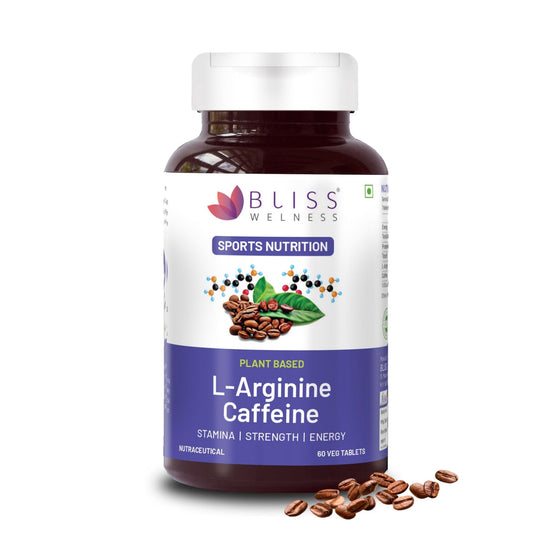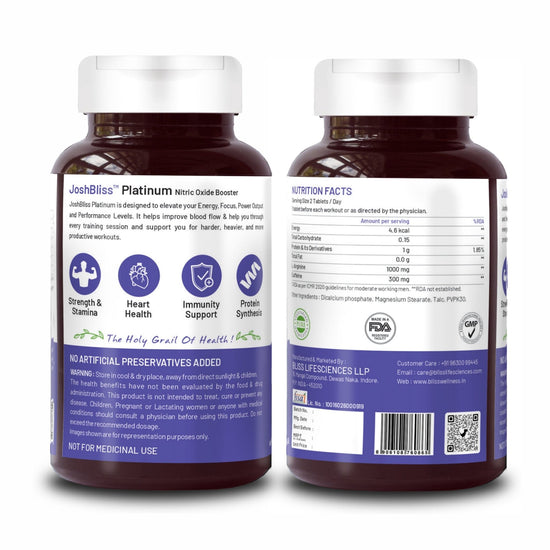2 products
-
Bliss Welness Happy Bliss : Happiness, Anxiety & Stress Relief Supplement | Supports Calmness, Mood and Happy Hormones | Supports Balance of Cortisol, Dopamine, Endorphins, Serotonin & Oxytocin |Memory, Love & Cognition Support, Raspberry Flavour

 Bliss Welness Happy Bliss : Happiness, Anxiety & Stress Relief Supplement | Supports Calmness, Mood and Happy Hormones | Supports Balance of Cortisol, Dopamine, Endorphins, Serotonin & Oxytocin |Memory, Love & Cognition Support, Raspberry Flavour
Bliss Welness Happy Bliss : Happiness, Anxiety & Stress Relief Supplement | Supports Calmness, Mood and Happy Hormones | Supports Balance of Cortisol, Dopamine, Endorphins, Serotonin & Oxytocin |Memory, Love & Cognition Support, Raspberry Flavour- Regular price
-
From
Rs. 840.95 - Regular price
-
Rs. 1,237.14 - Sale price
-
From
Rs. 840.95
Quick view
-
Bliss Welness JoshBliss Platinum Stamina Recovery Muscle Growth | L-Arginine Nitric Oxide & Caffeine 1300mg | Energy Gain Performance Pre & Post Workout Health Supplement - 60 Vegetarian Tablets

 Bliss Welness JoshBliss Platinum Stamina Recovery Muscle Growth | L-Arginine Nitric Oxide & Caffeine 1300mg | Energy Gain Performance Pre & Post Workout Health Supplement - 60 Vegetarian Tablets
Bliss Welness JoshBliss Platinum Stamina Recovery Muscle Growth | L-Arginine Nitric Oxide & Caffeine 1300mg | Energy Gain Performance Pre & Post Workout Health Supplement - 60 Vegetarian Tablets- Regular price
-
Rs. 202.86 - Regular price
-
Rs. 665.71 - Sale price
-
Rs. 202.86
Quick view
The Wonders of Caffeine: Exploring Its Benefits and Effects
Caffeine is a common stimulant found in various beverages and foods worldwide. Its stimulating effects on the central nervous system have made it a favorite for those seeking alertness and increased energy levels. But caffeine is much more than a morning pick-me-up. Let's embark on a journey through the world of caffeine and uncover its fascinating aspects.
The Origins of Caffeine
Caffeine: A Natural Alkaloid
Caffeine is a natural alkaloid compound found in the leaves, seeds, and fruits of certain plants. It acts as a natural pesticide, paralyzing and killing insects that attempt to feed on these plants. While it serves as a defense mechanism for these plants, humans have harnessed its stimulating properties for various purposes.
Discovery and Early Use
Caffeine has a history that spans thousands of years. Indigenous people in South America were among the first to discover the stimulating effects of caffeine-containing plants like coffee and cacao. They brewed beverages from these plants, using them in social and religious rituals.
Common Sources of Caffeine
Coffee: The World's Favorite Brew
Coffee is arguably the most well-known source of caffeine. It's a beloved beverage worldwide, with various cultures developing their unique coffee traditions. From espresso in Italy to pour-over coffee in Japan, coffee has a special place in our hearts and cups.
Tea: A Soothing Elixir
Tea, derived from the Camellia sinensis plant, is another widespread source of caffeine. Its diversity spans from black tea to green tea, each offering its distinct flavor profile and caffeine content.
Soft Drinks: Bubbling with Energy
Many carbonated soft drinks contain caffeine. They are known for their effervescence and are often consumed for a quick energy boost.
The Effects of Caffeine
Boosting Alertness and Focus
One of caffeine's primary effects is heightened alertness and improved focus. It achieves this by blocking adenosine, a neurotransmitter that promotes relaxation and sleepiness.
Enhancing Physical Performance
Athletes often turn to caffeine to enhance their performance. It can increase adrenaline levels, providing a burst of energy and endurance.
Mood Elevation
Caffeine is known for its ability to improve mood. It can stimulate the release of neurotransmitters like dopamine and serotonin, leading to feelings of happiness and well-being.
Metabolism and Weight Management
Caffeine can slightly boost metabolic rate, making it a popular ingredient in weight loss supplements.
Potential Side Effects
Sleep Disturbances
Consuming caffeine, especially in the afternoon or evening, can disrupt sleep patterns, leading to insomnia or poor sleep quality.
Jitters and Anxiety
Excessive caffeine intake can cause jitteriness, restlessness, and anxiety in some individuals.
Digestive Issues
For some people, caffeine can lead to stomach discomfort, acid reflux, or even gastrointestinal problems.
FAQs (Frequently Asked Questions)
Is caffeine addictive?
Caffeine can be habit-forming, leading to physical dependence in some individuals. However, it's not as addictive as substances like nicotine or opioids.
What's the recommended daily caffeine intake?
The FDA suggests a daily caffeine intake of up to 400 milligrams for most healthy adults, which is roughly the amount in four 8-ounce cups of brewed coffee.
Can caffeine help with headaches?
Caffeine is found in some headache medications because it can constrict blood vessels and reduce headache symptoms. However, it's essential to use it in moderation to avoid dependency.
Is caffeine safe during pregnancy?
Consuming caffeine in moderation during pregnancy is typically deemed safe. Nevertheless, it is advisable to seek personalized advice from a healthcare professional.
Does caffeine stunt growth in children?
There is no substantial evidence to support the claim that caffeine stunts growth in children when consumed in moderation.
Can caffeine improve memory and cognitive function?
Caffeine's stimulating effects may temporarily enhance cognitive function, including memory and alertness.






